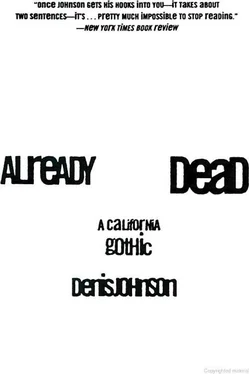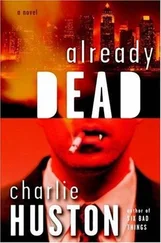He opened the door and stepped back. “Hey, it really is raining, actually.”
“Yeah, it’s gonna gust right in here if you don’t shut the door.” She knelt by the hearth and wrapped the sleeping bag around her shoulders.
“It’s roaring right down.”
She came and stood beside him at the open doorway, which was now suddenly a wall of wet. She took a breath to speak, but then just inhaled the rain’s overpowering perfume.
Almost a year later, after it was all over, the drought of half a decade broken, the Iraquis decimated, his latest love affair a faded remnant — but before he’d quit in confusion the Point Arena Police — Officer Navarro sat one dusk on the wooden bench in the Anchor Bay laundromat while his clothes revolved, and he tried to sort through a mess of pages that he considered to be strong document-ary evidence explaining events of recent history — the Fairchild thing, that whole tragic business. And anybody else would have agreed with him, outside of a court of law. But nobody else, as far as Navarro could tell, was interested.
Next to him on the bench lay the envelope he’d found the pages in, a white ten-by-thirteen mailer from the California Board of Franchise — the state tax people — the mailing label of which bore the name of Nelson Fairchild, Jr., now Xed-out and replaced by two names written, Navarro assumed, in Nelson Fairchild’s hand: TO:
Winona Fairchild
Carl Van Ness
For days he’d been combing through these unnumbered sheets, but he couldn’t quite get them into a sensible sequence. Going by the first and last words of each page, he’d arranged them in several bunches, each of which seemed to be in order. He was aided in some sections not so much by the syntax as by the shape of the brown stain along the right-hand margins. And then what must have been the end page actually written in blood — as if Fairchild had dipped a quill in a vein to record his fading thoughts. But Navarro couldn’t make a coherent whole out of all the separate parts… the devastating force with which , this one began midsentence,
the devastating force with which I am now this. Why do I think of lounges where black guys in mink coats softly worry the ice in their drinks? Films where the rotting corpse lifts up its hands? There are bars full of girls who do not want to be whores, they want to pick and choose, to fall, to find the shallows of love and be squandered. And who am I?
Girls with tears in their eyes and bus station grime. Drove south some weeks ago to San Francisco, what was I running from, nothing escapable certainly. Getting down there I drove fast, on the Jenner cliffs I nearly took to the air, not a suicidal thing but something more in honor of my powerful car. Then soon—
Navarro had been in the habit of driving down here from Point Arena after work, nine miles, had done it almost daily, and for half a year, to see Mo. But that was over. And actually Mo didn’t work across the street anymore. Still, he didn’t feel like visiting the Full Sails, a place draped with cruel memories.
He blamed the spirit of this region for that. And for lots more. Certainly for the trouble with Mo. But above all for something coming loose in his own soul…
So he sat here with the handwritten pages he’d read and shuffled obsessively since discovering them he didn’t know how many days ago — long enough, now, that he knew he wouldn’t be reporting the find — in the Silverado with the camper shell and the two dead dogs inside it.
Then soon coming south into Marin County, first the bulky towers, sagging power lines, there’s something elderly about them, and the last rural thing I saw was one farmer by the road, somebody who 142 / Denis Johnson
could have been my grandfather, except for this man’s olive-drab oversuit, which is just what Grandfather would be wearing if he’d lived to see these modern, incomprehensible times: dressed like a mass murderer he stands in the vineyard facing the Frosty King near Novato as the fields at their edges crumble into clouds, a sign that says SEEK
YE THE LORD and the smell of piss and shit from the dairy making lonelier the angles at which the planes of noon light lean…Everything gets kind of emerald down in Marin, and then the Golden Gate Bridge, and after that I just get tired. Frisco. Frisco. Frisco. They hate it when you call it Frisco. I can’t abide our beautiful cities, not even our San Franciscos — the scourge of smells — joints with greasy doorknobs — air brakes coughing and whooping — gargoyles and doodads on all the buildings — down every sidewalk crawl little bits of trash. But that day I should have felt exalted. South of Market the porno-shop windows gleamed like the windows of cathedrals. Inside, a cartoon sexuality under fluorescent lights, videos of glories gone wrong (Yes I’ve been in them but I didn’t find you, or anybody I ever wanted you to be).
And then Army Street with its flat-faced, secretive hotels, the pauper’s breath of its doorways, stinky old men in the parks, unrepentant winos standing on the corners like figures in a parable. If only I could decipher them. No I don’t want to. Ultimately all these old men turn out to be somebody’s father. And how frighteningly old he’s become, each one of them. Ultimately all these old-men thoughts turn out to be aimed at the matter of my own very ill probably dying dad (as he was that day, but now as you know all too well, no longer). And the faces, the faces, the faces: the murderous faces of children and the innocent faces of old men, the happy faces of the dead (Yes, and I want to tell you about that, I did actually see a dead person later that day). The planetary faces of gluttons. The faces of the rich sealed and locked. Also don’t forget the day-old immigrants with their stupid clothes and suddenly useless life histories and their faces like broken toys. I should have seen the beauty in their stares. The religion. Instead I parked and bought a newspaper right away because you can’t hide from them anywhere but in the movies.
Then I loitered with the newspaper at that restaurant where we saw the saxophonist, the breathy pissed-off one you probably don’t remember but who astonished me, the tough broad, the tenor. That time we found her it was Jam Night or some such — a pickup group Already Dead / 143
offers up an aimless jazz among cigarettes, our souls glinting and glimpsed in our plumes of smoke: our weird phony smiles, our bright exhalations — various semiamateurs trying out their moves, many of them talented but none like her. Remember how she extended her solos with reluctant widely spaced honks and quacks that made her seem disgusted? And I sensed in that a true cherishing of the art expressed as a loathing for her own attempts. And I’ve been back there once afterward with Melissa because I enjoyed it so much with you. Just as I’ve given Melissa poems I wrote for you and presents I bought for you. But in the morning it’s not a den of jazz and smoke but a sort of washed-out student place with a lot of I presume unemployed younger Chinese from Stockton Street and Clay Street. I wondered if I’d see the sax woman, find her surfacing with her cigarettes and coffee into the day, and I hoped so because I was so happy with the way she would with distaste in the manner of a thirties cinema belle kiss another and then just one more despairing note from the thing. But of course she wasn’t there, neither was the clarinet crying that it’s hopeless, or the alcoholic muttering cornet—
Where was I? Oh yes: assaulted by San Francisco, looking for a film to hide in. I opened the paper, turned to the entertainment part, and when I read the double-page ads for new releases I felt a thrill in my soul, so many wonderful movies, the critics were amazed, according to the testimonials. Poets of the age! hack off your tongues. The impression dawned that we’d entered a dazzling era — this week, this single week, would glow in racial memory — and I shared it all, was in fact dazzled, you know how I respond to those ads and feel cheated later in the dark by all the fakery. But it doesn’t matter. Nothing can help us anymore. There’s no escaping the contradictions: but only here, at the movies — window looking out on the home from which I’m exiled — land where people look in one another’s eyes feeling the words they say.
Читать дальше












